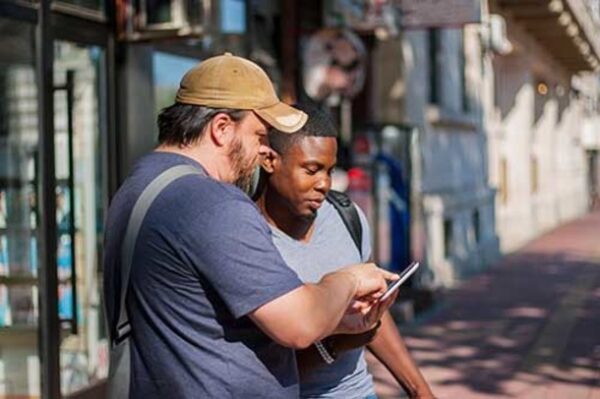Our previous article gave you examples of how you could make travel suggestions. We’re now going to show you some phrases you can use when asking for information.
You may need to go to a particular place or building when you are travelling. Use Is there … ? to ask if there is such a thing where you are. You may need to get someone’s attention before you can ask them a question. Use Excuse me to do this.
Excuse me, is there a garage near here?
Is there a campsite near here?
Is there anywhere with rooms to rent in this village?
Is there a food shop in this street?
Are there any restaurants around here?
You may want to find out the way to do something, for example how to buy a ticket. Use How do … ?.
Excuse me, how do I buy a ticket from this machine?
How do I use this phone?
How do I call a number in Germany?
How do we get to the station?
If you are looking for somewhere and you want information about how to find it, use Where … ?.
Where is the train station?
Excuse me, where is the ticket office?
Where can I buy a ticket?
Where is the town centre?
You may need advice when there are many choices and you need to know the right one for you. Ask Which … ?.
Which train do I take, please?
Which bus goes to the town centre?
Which platform is the train for London?
Excuse me, which train goes to Barcelona?
If you want to ask a general question you can use Is it … ?.
Is it this way?
Is it near here?
Is it far?
Is it on the right?
If you want to know the time that something happens, ask What time … ?.
What time does the train leave?
What time do we get to Brussels?
What time do we arrive in Portland?
What time are we boarding?
If you want to ask how much time something takes, use How long … ?.
How long is the flight?
How long does the journey take?
How long does it take?
How long will it take us to walk there?
If you want to ask how many times something happens, use How often do … ?.
How often do the trains go?
How often do the trains to Cambridge go?
How often do the buses to Edinburgh go?
If you want to ask about the money that you need to do something, use How much … ?.
How much is a ticket to Beijing?
How much is a return ticket?
How much does it cost to fly there?
How much does it cost to hire a car?
Use Can I … ? to ask if you are allowed to do something.
Can I buy a ticket on the train?
Can I leave my bags here?
Can I change my ticket if I need to?
Can I pay by credit card?
Useful words
a garage a place where you can have your car repaired
a campsite a place where you can stay in a tent
a room a separate area inside a building that has its own walls
rent to pay the owner of something in order to be able to use it yourself
a machine a piece of equipment that uses electricity or an engine to do a particular job
a ticket office the place in a station that sells tickets
a bus a large motor vehicle that carries passengers
a platform the area in a train station where you wait for a train
far a long way from somewhere
the right the side that is towards the east when you look north
board to get into a train, a ship or an aircraft to travel somewhere
a journey an occasion when you travel from one place to another
a return ticket a ticket for a journey to a place and back again
a credit card a plastic card that you use to buy something and pay for it later
Next time, you’ll learn how to ask for things, such as tickets, or receipts.



